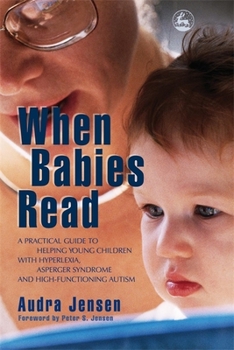When Babies Read: A Practical Guide to Helping Young Children with Hyperlexia, Asperger Syndrome and High-Functioning Autism
Select Format
Select Condition 
Book Overview
Audra Jensen' son began reading when he was only two years old. She shares her experiences - both the challenges and joys - of raising a child with autism and hyperlexia - an early and obsessive interest in the written word associated with social deficits and significant difficulty in understanding verbal language. The author stresses the importance of diagnosis of the condition for successful implementation of effective teaching strategies...
Format:Paperback
Language:English
ISBN:1843108038
ISBN13:9781843108030
Release Date:August 2005
Publisher:Jessica Kingsley Publishers
Length:192 Pages
Weight:0.68 lbs.
Dimensions:0.5" x 6.2" x 8.8"
Customer Reviews
4 ratings
Outstanding
Published by Thriftbooks.com User , 18 years ago
I could not understand why my child had traits of both autism and Asperger's. I had heard of hyperlexia but thought it only applied to children that could read by age two. I was mistaken. After reading this book, I realized that my child has high-functioning autism AND hyperlexia (which has now been confirmed by two professionals). I saw so much of my own child in this book, including the way that she responded to ABA. I now understand my child so much more than I ever hoped for. We have incorporated some of Ms. Jensen's suggestions into my child's ABA program and daily living and are amazed at the difference they have made. I cannot thank the author enough for making such a difference in all of our lives.
A great resource!
Published by Thriftbooks.com User , 18 years ago
Having a 4 year old son with hyperlexia, I found this book exceptional. It includes information about hyperlexia, its treatments, and school related guidance Information is chunked in easy to read format with practical suggestions for implementation in the home. Hyperlexia has so little information and resources, this is truly a one of a kind book.
Finding a way to balance unusual gifts with developmental delays
Published by Thriftbooks.com User , 18 years ago
I am the mother of a beautiful 4 year old boy with hyperlexic autism. He learned the alphabet and taught himself to read before he was 2 years old. I was delighted to see that another mother of a hyperlexic child wrote this book explaining how to channel a child's natural gifts to learn about the world and remediate developmental delays. The author makes it clear that every child has a different learning style, so what worked for her son may not work for other hyperlexic children. This book is perfect for a family with an established Applied Behavioral Analysis (ABA) program for their hyperlexic child at home or at school. To my knowledge most ABA programs ignore a hyperlexic child's desire to read (at one point my son was actually forbidden to read at preschool!), so this is a refreshing change of course to incorporate the child's interests into an early education plan. The book is filled with step-by-step outlines and terrific illustrations for early literacy and communication skills. At home we use play-based therapy, not behavioral methods, but my son loves the flash cards from the book and typing up stories with me. I had some problems with this book. On page 26 the author mentions that her son's therapy was partially or mostly covered by insurance and implies that other insurance companies will do the same. This is not the case in the USA - some states do not even provide early intervention services through the school district, and many parents of autistic children have sold their houses or gone bankrupt to pay out-of-pocket for their child's therapy. I would love to move to the state of Washington and sign up for the author's insurance plan! Another problem in the book is the absence of any discussion about the severe anxiety, phobias and panic attacks that are characteristic of hyperlexia. In fact the author even says that she allowed her son to scream and cry through several weeks of behavioral therapy before he learned to comply, never even addressing the issue of anxiety. For parents who are looking for a more humane approach to anxiety, I recommend "Your Anxious Child" by John Dacey and Lisa Fiore. I have a personal issue with author's frequent negativity about autism, for example, saying that autism was "eating away" at her son and, "We must fight this," and even naming one chapter "Line of Attack." How can we accept a child unconditionally if we reject such a large part of his life? Remediation should be based on building relationships, not destroying behavior. With that said, this book is a rarity: it balances the core deficits of autism with its remarkable gifts, and offers one way to harness these gifts to support the child's healthy development. After reading this book, I donated it to the parent-teacher resource library at my son's school.
Great work from a great lady
Published by Thriftbooks.com User , 18 years ago
I am admittedly biased, having had the pleasure of knowing the author and her family for several years, but this important book is wonderfully assembled and very readable. It puts into plain language the difficulties of identifying autism/Asperberger Syndrome early enough to effectively treat it, and the absolute importance of early detection. From Audra's example, we have learned to be proactive with our children's early development. In this regard, this book is more than a wealth of information on a growing problem affecting our society today, but also a call for action to parents of young children. I really think this book can help all parents and people who work with young children.





